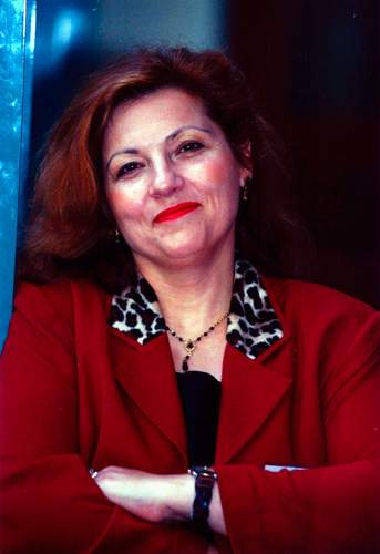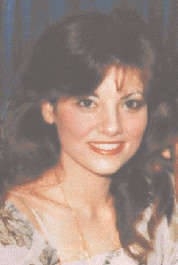Maria Hill. Philhellene & Philokytherian.

Photograph. 2001 – taken by NSW Department of Education & Training for Maria's State & National Discovering Democracy Award
WEBSITE: http://www.mariahill.com.au
Curriculum Vitae
October 2006
Personal Profile
Name: Maria Hill
Email:
Contact Maria Hill
The Honours Thesis:
"I was born in Athens, Greece on the 14th January, 1956. At the age of 3, I came to Australia with my parents. My father Theodore (Theothoris) was an industrial chemist. He was born in Pyrgos, a town on the Peleponnese south of Patra and west of Olympia. My mother was a housewife. She had escaped with her family, as a young girl from Smyrna. I was the eldest of 2 children.
While growing up in Australia I felt a great sense of confusion about who I was and where I belonged. In retrospect I realized, but not at the time, that this confusion was caused by mainstream Australian culture which ignored the existence of migrants.
While purporting to welcome migrants into the wider Australian community, the Australian Government gave contradictory messages, on the one hand wanting migrants to become part of Australian society while at the same time rejecting them for not being Anglo- Celtic and Protestants. This dichotomy created the confusion I felt about my identity.
To find answers to my problem I decided that as part of my Honors degree in History I would focus on understanding how Greek families in Australia who arrived before the Second World War adapted and changed as a result of migrating to Australia and where their children and grandchildren fitted into this huge continent.
Questions such as "Did they remain in ethnic ghettoes or were they socially mobile?" were explored.
In the final analysis I discerned the formation by the third generation, of a distinct and unique identity:
"The Greek-Australian identity" vibrant, alive and just as valid and important as the Anglo- Celtic Australian identity for the development of a distinctly Australian NATIONAL identity.
"A Landmark Thesis of 66,000 words I did not find all the answers but I was able to make a significant contribution to research in family studies, oral history and immigration". Written in 1978, when Maria was a tender 22 years old, the thesis was a 'leader' in the field of both oral history and ethnic family studies in Australia. It was written at a time when there was no Institute of Family Studies in Australia and neither was there an Oral History Association in existence. These organizations did not come into being in Australia until many years later. Therefore the oral history methodology used had to be developed primarily by the author. The only user guidelines available for Oral history were from folklorists. Furthermore understanding and documenting family life was in its infancy in Australia. Monographs existed but not many.
"Thanks: I would like to thank my husband Stuart J. Hill who reproduce the photographs for my thesis and drew all the maps. I would also like to thank my brother Nectarios Costadopoulos, Phillip Kazanis, Magdalene Fong and Devi Nyar for the many hundreds of hours that they put into preparing my thesis for publication on the World Wide Web, as part of their Master course in Information Systems, Engineering at the University of Technology Sydney".
http://www.cybernaut.com.au/greeksinoz/
Many of the oral histories that were taken during the writing of this thesis were conducted with Kytherians.

Maria Costadopoulos-Hill. 1978.
Publications
Federation: Inclusion and Exclusion, state-wide Educational resource kit commissioned by NSW Centenary of Federation, produced by the NSW Department of Education and Training 2000.
Maria Hill & Ian J. Bickerton, Contested Spaces: the Historiography of the Arab-Israeli Conflict, McGraw-Hill, North Ryde, 2003.
Papers
The Emergence of the Palestinians Since 1948 Part I: The Palestinians Before the Creation of Israel, Journal of Arabic Islamic & Middle Eastern Studies, Vol. 4, No.2, 1998.pp.113-41
The Emergence of the Palestinians Since 1948 Part I: The Palestinians Before the Creation of Israel, Teaching History, Volume 33, No.2, pp.19-33.
The Emergence of the Palestinians Since 1948 Part 2: The Palestinians After the Creation of Israel, Journal of Arabic Islamic & Middle Eastern Studies, Vol. 4, No. 3, 1999, pp. 45-59.
Electronic Publishing
Honours Thesis: Greeks in Australia: “Images of the Greek Family in Australia”
http://www.cybernaut.com.au/greeksinoz/
Winner: ‘Best Electronic Publishing Award’ (1997) from School of Journalism, University of Technology, Sydney.
Grant Applications:
May 1999 applied for and was awarded a grant from the ‘Commonwealth Discovering Democracy school based initiatives,’ to write a program for the state on civics and citizenship.
June 1999 wrote and submitted a joint grant application with the School of History, University of New South Wales, for funding to develop, an ‘On-Line Civics Education Centre,’ for the professional development of rural and remote teachers.
Special Awards:
National Winner, Secondary Teacher Category, Discovering Democracy Achievement Awards, Canberra, 20th June 2001.
State Winner, Secondary Teacher Category, Discovering Democracy Achievement Awards, Sydney, 27th June 2001.
2001 awarded an Australian Postgraduate Scholarship from UNSW to complete PhD in History.
2001 awarded a full-time Study Leave Scholarship by the NSW Department of Education and Training to write a PhD thesis.
2003 awarded a competitive Army History Grant to undertake overseas research for the PhD study.
Awarded Centenary Medal by the Commonwealth government for the writing of kit Federation: Inclusion-Exclusion.
The Ph.D
"My PhD thesis, due for submission end of January 2007 is entitled:
The Australians in Greece and Crete: a study of an intimate wartime relationship.
It examines 'relationships in war' and their significance. It also provide a Greek perspective on the events in terms of providing an understanding of why the Greeks acting as they did during the war. It is an attempt to write the Greeks back into the history of these campaigns.
Furthermore, it explores the reasons why the Australian relationship with the Greeks was so successful- what was it about the Aussies that appealed to the Greeks and visa versa?
In conclusion it emphasizes the importance of knowing one's ally as well as one's enemy for the success of a campaign. The thesis is original in that no one has critically examined the Greek-Australian war-time relationship before, even though politicians continually refer to the close bond that was forged by the war between Australia and Greece".
Areas of Research Interest
Virtual Histories: History and Technology
Civics and Citizenship studies
Australian History- including Greek migration and history
Arab-Israeli Conflict and Nazi Germany
Gifted and Talented Education & innovative pedagogies.